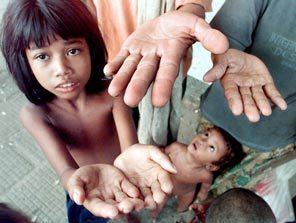Wie geht man auf Reisen mit bettelnden Kindern, mit Müttern und Kleinkindern, die auf der Strasse übernachten, um? Soll man billige Reisebücher von Strassenkindern kaufen? Wie weit soll man den Preis herunter handeln?

DAVID LONGSTREATH / AP - Is there a "right" way to spend, tip and give money when traveling in developing countries such as Cambodia?
Ein paar Tipps (Quelle):
Fix a daily or weekly budget. You may not be able to avoid feeling like a patsy or a skinflint, but a budget of how much to spend, tip or give will create a structure for your own sanity. The goal is to walk that tricky line between helping and having every encounter turn into a negotiation. You’ll never make everyone happy, but at least you’ll have a framework.
Overbuy gifts for yourself and others. This is our favorite method of economic development. It helps fuel employment (the most dignified form of money transfer) and it has the residual benefit of having something to bring back home. On a trip to India, we bought a gorgeous hand-woven rug in Jaipur, a piece that we were told took more than four months to make. As our guide, Ashok Verma, later told me: “Crafts are the best thing to buy; they have people’s dreams woven into them.”
Don’t bargain down price, bargain up quantity. Joan wanted to buy a set of colored stamps with bindi (Indian forehead dots) for the seventh-grade students she teaches. One hundred rupees, the vendor said. No, too expensive, she replied, following cultural norms of bargaining. The negotiation was on. Finally, Joan bought three sets for that same 100 rupees (about $2). The man got his price, she got more stamps.
Honey urges travelers to stop bargaining before they are the only winner. “Let people earn a real wage,” she cautions.
Try to be more than a consumer. Local citizens “may be economically poor but they are often culturally rich,” says Harold Goodwin, professor of Responsible Tourism Management at Leeds Metropolitan University in England. So, engage in their culture by getting off the large bus and taking an interest in how they make their living.
It’s OK to take photos of individuals who capture your interest — but only if you ask first and pay if requested, he adds. The rule is simple, Goodwin says: “Treat them as you would like to be treated.”
Let others earn a living by helping. In American airports and hotels I never get help with my luggage; wheeled bags roll, don’t they? But overseas, I’ve learned to relax and let someone else carry my suitcase. It’s a rational way for local residents to feed their families.
Don’t give to panhandlers. Handouts send a multitude of wrong messages about dependency and the value of work. Plus, handouts encourage more begging, often by children (an awful alternative to school). Long-term change never starts with a quarter or even $10 stuck into someone else’s palm. Still, even Honey, of the Center for Responsible Tourism, concedes she breaks down sometimes. “I tend to give to women and children because they are the most vulnerable.”
Do buy stuff on the street. The hawker’s life is a tough one, always a fight against weather, traffic and crime. So if you want to help, buy more than you usually might. Granted, I acted counter to this by not buying that T-shirt from the boy in Syria, but, as I think about it now, what would it have harmed if I had? Since then, I’ve purchased boiled eggs, bagged water and toys. (I politely said no to a kitchen strainer.) Why not bolster that small-business spirit?
Den ganzen Artikel findest du nachfolgend:


